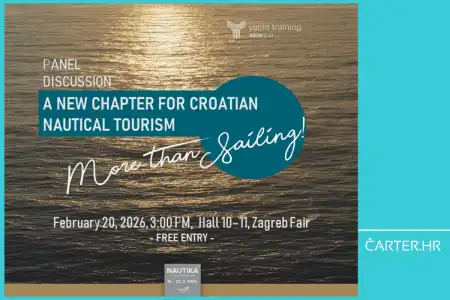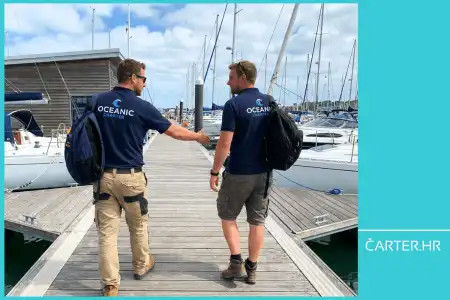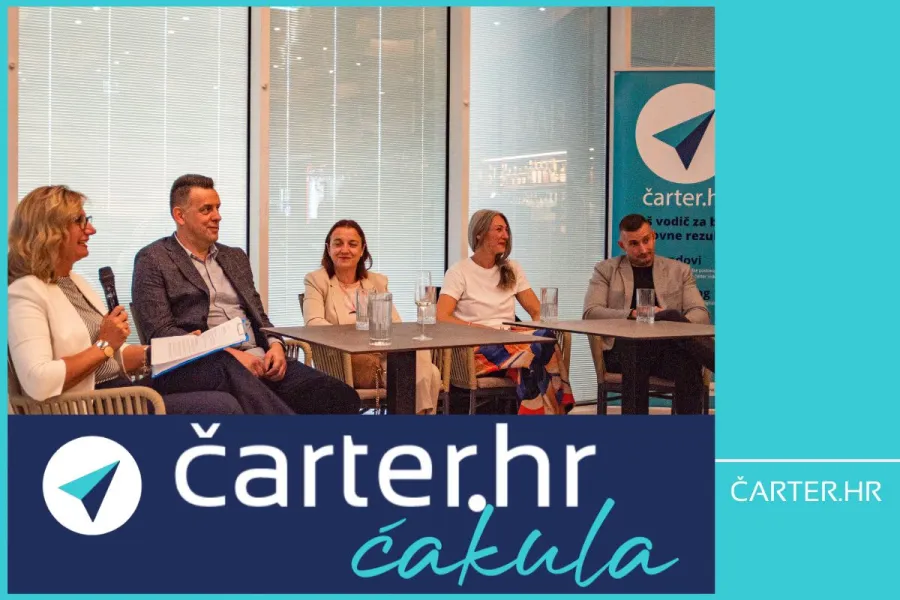
- 09.10.2025.
- News
At the third Čarter Ćakula, discussions focused on challenges as well as solutions for a more successful future of the yacht charter industry. Panelists emphasized the importance of people and team organization, digital tools, and a different approach to the market. The conclusion is clear - significant change is necessary already from the next season.
Once again, the third Čarter Ćakula - a panel discussion and networking - was held this year in Sukošan, on October 8, 2025, at D-Marin Dalmacija. The theme of this year’s panel discussion was: “Time for change: people, processes, and technology in Yacht Charter.”
Our panelists were:
- Ivica Žuro, financial advisor from MM Beneficium
- Anita Majstrović Dukić, owner of RESET and expert in team management and HR
- Andreja Fazlić, consultant for CRM and customer experience, AstartaBit
- Ivica Lovrić, director of Workspace agency and creator of the Servizz app
The panel was moderated by the founder and owner of the charter.hr platform, Selma Ćubara.

The panel began with the introduction of the panelists, where all attendees, mostly representatives of yacht charter companies, had the chance to get to know our panelists and their businesses better.
The moderator’s opening remarks introduced the topic with a short overview of the still ongoing season. Alongside data on the percentage of bookings in yacht charter and the recorded decline in German guests, it was highlighted that catamarans are increasingly in demand by guests, and that the guest composition includes fewer and fewer "true sailors."
And when the bottom line is drawn, it becomes more than obvious that the large number of vessels in our marinas is becoming a kind of problem, which results in challenges with reservations as well as revenues.
If we set aside challenges that will not disappear, such as high marina costs and dumping prices, what remains is what we can influence, and that is the small everyday things in operations and the change in mindset that can already make the next season better.

What could yacht charters do differently, already from the next season
The first question to the panelists was how they, observing the yacht charter industry from the outside, see what could be done differently in it and what changes yacht charter companies could introduce into their business so that the next season would already be more successful.
Ivan Lovrić touched on price dumping:
“Yacht charters are competing with each other on price, instead of on quality. Quality can also be achieved digitally, because yacht charters can position themselves better through digital channels; social networks, web presence, and by strengthening the brand and visual identity. Also by investing in tools that can increase that operational efficiency.”
Andreja Fazlić stated:
“When you draw the line after this season, think, and then when you think you are done thinking - think once more. Ask yourself some key questions: what should I be doing next year so that I am not again caught in the same wave of price dumping, what exactly is it that I should and could be doing differently? What is that specific offer or value that I provide, that stands out in relation to that price, but no one else communicates, because everyone is focused on how much discount someone has given?”
Anita Majstrović Dukić commented on that:
“I can assume what problems you have with people, and what is very important is, regardless of the industry, how you will hire the right people. The second thing is competences. You think it is implied that everyone knows how to talk to guests and that everyone reacts well in crisis situations, but that is not the case. You need to be aware of what each job position entails. A parallel can be drawn with hospitality, work instructions are created once and you have everything documented and the job can flow with much fewer problems and mistakes.”
Ivica Žuro stated that the next season could already be more successful if a strong and united association of charter operators were established:
“Your direct competition are four-star hotels, but they have state support and credit lines with grace periods. The problem lies in the lack of organization on the part of yacht charters, you need to assert yourselves as an interlocutor. Part of the market is slowly being taken over by cruise ships, the Eastern Mediterranean is becoming increasingly popular for travel, and if you do not assert yourselves and if you are not loud enough to be constantly present somewhere. It will always be the same.”
It was concluded that a stronger association of yacht charter companies and stronger pressure on state institutions is needed, because the yacht charter industry is being sidelined, since it makes up “only” 3% of the total tourism offer of Croatia. The impression that is created is that if charter operators are not complaining, it means they are doing fine.
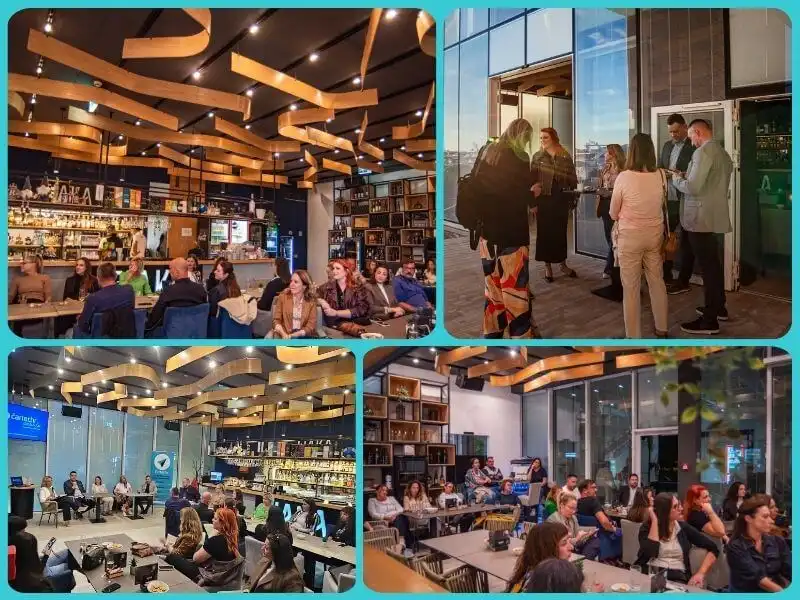
Workers, their needs, but also the needs of yacht charters
The next block of questions referred to what is crucial for yacht charter companies, but also for all others, when it comes to the workforce – what must not be ignored, yet is often neglected.
“These are actually two different segments,” said Anita Majstrović Dukić. “First, your business must be clear to you, and only then will you be able to transfer knowledge to new as well as existing employees. Whether you are small or large, you all have the same processes, sales, procurement, maintenance, etc. It must be clear who does what, you do not need to document everything, but you can start with the segments where you have had the most problems.”
Majstrović also touched on the directive on pay transparency. In practice, this would mean that in a job advertisement, for example, you would have to state the exact amount or the pay range you are offering for that position.
Employers with 100 or more employees will have to report on pay differences between genders, including allowances and bonuses, as well as the median of those differences. The deadlines depend on the size of the employer: those with more than 250 employees must report annually from June 2027, those with 150 to 249 employees every three years from the same date, while employers with up to 100 employees will start with this practice from June 7, 2031.
Organizational culture i.e. “the way you work”
On how businesses and strategies look in the real world and real Croatian companies, and how they actually should look, Andreja Fazlić spoke more on the panel.
“Stop for a moment and think about what you want with your business. Do not go year after year, season after season, the same way. You already know that scenario by heart, you do not even think about it anymore. You know the season will start and that you will all lose your heads and that someone will give a bigger discount. This is where we come to this - you need to write down who does what.”
Andreja Fazlić also pointed out that the concept of organizational culture is actually “the way you work” in your company and how you see the guest off, how you respond to offers… All those processes and details must be documented, and everything starts with managers and owners. If they do not support and respect work processes, then neither will employees.
The panel also touched on the topic of direct guests, who are becoming fewer in yacht charter, since yacht charters mostly work through intermediaries/agents. On this Andreja commented that perhaps it is time for yacht charters to move away from established patterns of behavior and to consider the following - do you also see the agent as your customer?
Introduction of tools and their implementation
At Čarter Ćakula, the topic of implementing digital tools and solutions was discussed, with situations often occurring where the implementation is not carried through to the end. Who is the one who decides what will be used in the company and which tool will be used?
Ivan Lovrić on this topic said that processes that do not work in physical form will not work digitally either.
“Digital tools and technologies are here to help you. Real transformation happens within yourselves. You have to adapt to changes. Yes, employees will resist or even fear the tools, but it is up to the manager to communicate that and explain the benefits, the goals, and how those tools can actually help them. Every change takes time and for results to be seen. Often it is abandoned without even giving the tool a real chance. So we can freely say that it is a kind of vicious circle.”
Andreja Fazlić followed up on this topic and said that 70% of digital tool implementations and digital transformations in general do not succeed. And that is because owners and directors do not work on their own development in order to be able to sustain the growth of their own business. Change must begin with owners and managers, in any sense, but they are the key factor and must participate.
Is it financially worthwhile to invest in teams, IT, and marketing?
One of the topics, familiar to all panelists, was the question of whether money invested in business development is considered an investment or an expense, how companies, including yacht charter companies, view it, and how to justify what is being invested in and with what goal.
Ivica Žuro commented on this:
“When you are constantly losing money somewhere, it is a sign that this problem needs to be solved – whether it is a specific vessel or something else. Such a loss can be accepted as a conscious expense, but if you are not ready to clearly list where your money is going and face it, that is also a decision. In any case, it is crucial to know what you no longer need in your business.”
To the question of the panel moderator, Selma Ćubara, what he would advise yacht charters, how to approach their finances in a different way that still makes sense, Ivica said:
“Costs should be spread over as many years as possible, if you are paying a certain amount of money in a unit of time, try to stretch it over one and a half to two units. That is the only way, and that is what any bank will also suggest to you, to ‘breathe’ in the short term. And then dedicate yourself to analyzing your business and costs.”
In yacht charter, a big problem is collection and cash flow, and yacht charters are mostly paid in advances. Can the yacht charter sector reorient itself to some new, more efficient and sustainable model? Ivica commented on this:
“Overnight it is impossible. But you need to start with basic habits. Changing the method and model of collection requires a lot of time. Do not engage in it if you are not ready to dedicate yourself fully to it, otherwise it makes no sense.”
Marketing is what will attract guests
Panelists discussed how behavior patterns and mindset need to change. Guests today no longer tolerate empty stories, but demand a top-quality experience.
With the help of marketing, business can be transformed and when teams are well organized, that marketing part must not be left out. In today’s environment, it is no longer possible to function without marketing. Having Instagram and Facebook and thinking that is marketing is no longer enough.
Marketing is what will attract guests and there is no longer an intermediary to whom you must justify yourself. The question was raised of how to structure marketing processes.
Andreja Fazlić asked those present “Have you noticed that you yourself have changed as customers? Have your habits changed? Have you become more demanding as a customer?”
She concluded with “Why do you think your customer is not the same way?”
She said that everyone needs to be ready to change themselves in order to get to where the customer is. “Your customer is wherever they are given more attention and where they have a greater sense of satisfaction. And personalization is not just a name in an email.”
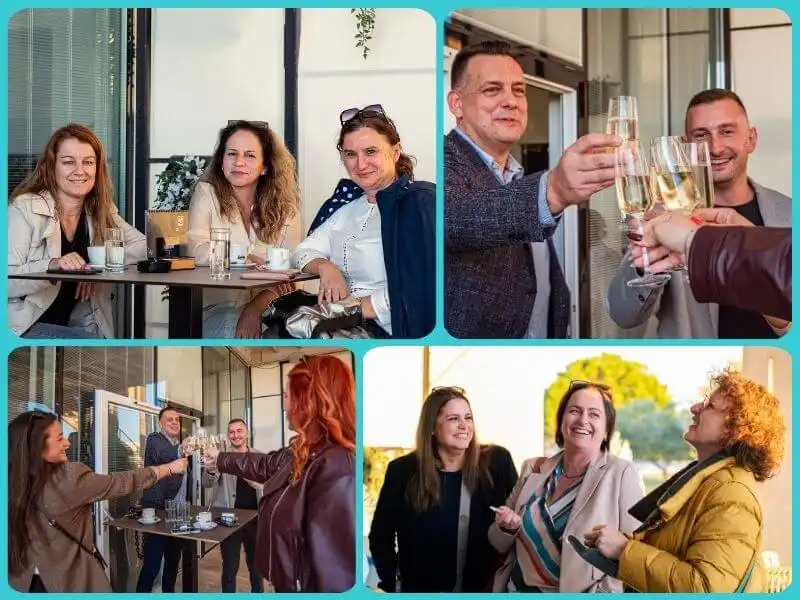
And finally - what can be concluded
At the end of the panel, moderator Selma Ćubara emphasized that the rules of the game can be changed. Although yacht charter companies are competitors to each other, the industry in certain segments must be directed toward a new course. Problems will not disappear, nor will someone else solve them, therefore they need to be recognized and addressed on time.
She invited the panelists to give their conclusion and their message to yacht charters in Croatia.
Ivica Žuro: “In conversations with several yacht charters across the Adriatic I realized that privately owned boats under management are becoming increasingly successful. And if one of your vessels is not ‘out there’ enough, and it is known how much of a cost that is to a yacht charter with zero profit, then something needs to change.”
Anita Majstrović Dukić: “Start already now with analyzing your business: look at what you have, how much you earned, what complaints and problems you recorded. After that, approach solving them – whether it is about relations with agents, employees, or job descriptions. If you cannot do it yourself, seek help. The most important thing is to honestly assess the past period and step by step make changes, because that way you will be more satisfied year after year.”
Andreja Fazlić: “If you so strongly want different results, the only thing left is to do things in a different way. I think we have all heard that many times in life, but there is no other way.”
Ivan Lovrić: “In conclusion I can say that once you eliminate price as the main factor, i.e. price dumping, the only thing left is the factor of quality. And when we talk about quality, then we have an entire spectrum of possibilities for how you can work to position yourself better, so that the client separates you from the competition. This period is excellent for investing in such things, and I also believe that investing in digital channels should be seen as an investment, not as an expense.”
The charter.hr platform hereby once again thanks its panelists and associates, as well as all those who joined this Čarter Ćakula with their presence.
For more information on how it was, follow us on social media and if you have not already, subscribe to our regular newsletter.
Categories of trends
- News
- Sale
- Marketing
- SEO
- Web design
- Social media
- Technology
- Regulations
- Management
- Education
- Finances
- User experience
Newsletter
Sign up for the newsletter and receive the latest trends and tips straight to your inbox

